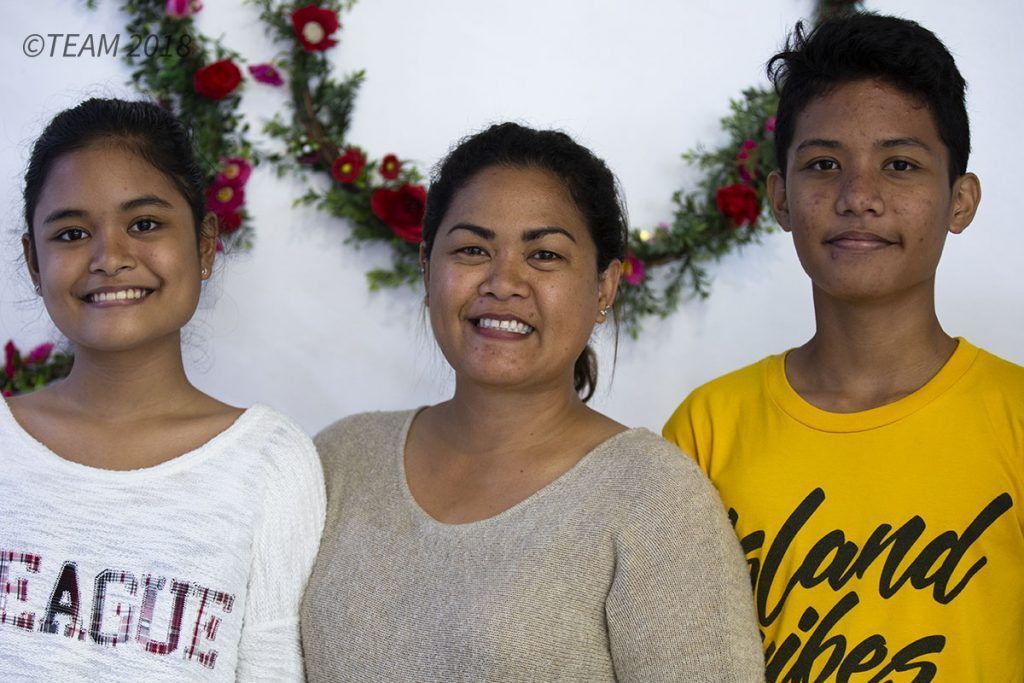When Christiane saw her chance to escape, she fled like a fugitive. She’d already tried to leave the country, so she went to another island in the Philippines instead. She broke the SIM card in her phone so no one could call her. She cut her hair.
People back home were hounding Christiane for money — far more than she could ever give them.
Her only option was to never be found.
But Christiane’s hard-won freedom was not what she expected. She spent her days alone in a small room, caring for a baby and struggling to survive.
“I knew God was there, but I was too ashamed to communicate with Him,” she says.
Deep in her heart, Christiane wondered, was her old life really all that bad?
A Childhood of Hardship
Christiane had grown up going to church with her mom. But like many Filipinos , she never felt a deep dependence on God. Christiane’s family was desperately poor, so Christiane’s parents taught her to fight for every scrap she could get.
After high school, Christiane got an entry-level job. And for a time, she saw a glimmer of hope.
Christiane’s boss introduced her to TEAM missionaries Kathy and David North , who were leading a local church plant. Christiane started attending and being discipled. She joined the worship team. Two of the Norths’ co-workers even helped her pay for college.
The church was like an oasis from all of Christiane’s hardships. But that oasis couldn’t protect her from the pressures she faced at home.
Family Pressure Drives Christiane Away
As Christiane’s parents got older, they pushed Christiane and her siblings to support the family.
“They kept on telling us that we had to work hard and do whatever it takes to take our family out of poverty,” Christiane says.
By now, Christiane was fresh out of college. There was no way she could get a job to pay for her parents’ demands. But they didn’t care.
So Christiane came up with a plan.
Christiane was already dating a man from Korea, Han-bin*. And though Christiane’s missionary friends had concerns about the relationship, Christiane knew she could earn good money if Han-bin took her back to Korea.
As Christiane thought about the possibilities, her fantasies grew. She could send her younger siblings to school. She could buy her parents a house. She could have everything she wanted.
There was just one problem: Han-bin’s parents didn’t want a poor Filipina for their daughter-in-law. They refused to sign Christiane’s immigration papers.
And just like that, Christiane’s dreams were shattered.
Christiane didn’t know how she could face her concerned missionary friends after this devastating fall. So, when an old boyfriend asked her to visit him on the island of Cebu, she jumped at the chance.
Christiane Escapes to Cebu
Christiane and her old boyfriend, Jonah, moved in together, and Christiane cut off all contact with her old life.
But this new life wasn’t any easier.
Jonah only earned minimum wage, and soon, Christiane became pregnant. She spent her days cooped up in their tiny apartment. No job. No friends.
Christiane and Jonah got married, and then Christiane got pregnant again. All the while, they struggled to survive — just as her parents had.
“All I could think was how much I wished I wasn’t here,” Christiane says. “I wished I could turn back time.”
She longed to go back to her missionary friends. She wanted to kill herself. But she couldn’t do either with two children depending on her.
So, she turned to a life of partying.
Depression Turns to Partying Lifestyle
If Christiane couldn’t have her old life back, she didn’t want any reminders of it.
She got tattoos, dyed her hair and started drinking heavily. She even changed her name — because how could she call herself “Christiane” when she wasn’t living like a Christian?
She started seeing other men — and endured terrible abuse at their hands. She and Jonah split up and got back together.
“The more I turned away from the Lord, the more bad things happened to me,” Christiane says.
Her suicidal feelings grew. She thought, I don’t care if I die. If I go to hell, so be it.
But strangely, something kept her holding on.
“In the deepest part of me, I knew there was a God, and that somehow He could save me. … But I only had this tiny — like a grain of sand — piece of faith,” Christiane says.
It would be enough.
She Finds Hope at the Grocery Store
One day, thirteen years after Christiane left for Cebu, she and Jonah walked through the grocery store — and came face-to-face with David and Kathy North.
Christiane could hardly believe it. The Norths were the missionaries from her old her church. But now, they said they were starting a church plant in her local mall.
They invited her to come!
After years of avoiding church, Christiane can’t fully explain why she decided to go.
Maybe it was the way the Norths met her with love instead of criticism. Maybe it was the longing already in her heart.
That Sunday, the worship songs tore at Christiane’s heart.
“I’m a tough woman, but you can’t say no when God is calling you,” Christiane says.
Christiane asked the Norths for forgiveness. Then she asked for discipleship.

Today, Christiane has rebuilt her relationship with her kids (pictured here) and her husband. They attend church together every Sunday, worshiping their Savior.
Today, Christiane’s whole family attends church together — and God is healing their relationships.
“The life and family that I had before was just godless,” Christiane says, “but now, I’m proud to say that God is the center of our family.”
Thank you for sending missionaries like the Norths to reach people like Christiane. Through your generosity, you have changed not only her life, but the lives of her husband and children. You are a blessing!




















